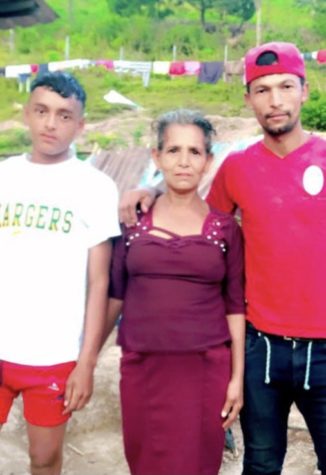English
March 17, 2023
Freshman Ronal Edelsi Herrera remembers Christmas back in Honduras when he was 7-years-old, and his family and friends would get together and celebrate.
He remembers the big family reunion and the amount of food that was enough for his whole family to eat. Back then, the holiday meant much more to him as he was surrounded by family.
Herrera, who is one of nine siblings, crossed the border four years ago to come to the U.S. and find a better life for his family and himself. His father had died before he could really know him, so his mom would work hard for him and his siblings.
This was the case until he decided he wanted to come to America, leaving his mom unsure of the decisions. He was persistent, and sat his mom down to tell her his plan: to continue studying and working hard.
In Honduras, he began working at a bean farm with his family at the age of 6 doing small jobs and spending his days at work.
He was enrolled at a school, but he’d be at work on the farm more. There, he would meet a worker who saw his potential and would bring him over to the U.S and pay to go and help Herrera get there.
“My family didn’t want me to come,” Herrera said through a Spanish translator, “but I decided to because I wanted a better future for my life and be able to help [my family].”
The journey from Honduras wasn’t the easiest. He had to worry about the obstacles in the way, such as crossing a river in a raft near the border and getting through immigration police, but immigration did not notice him.
Herrera doesn’t remember much about leaving Honduras, but he does remember that he left at night.
Once getting to the U.S, he went straight to Indiana on a bus. When he first got here, he was hopping from house to house, staying with
people he knew.
After, he started living with the family friend he met at work. A week after his arrival, he was enrolled at Southport Elementary.
To Herrera, life in America is not the same as Honduras. Back home, he mentioned that he was able to go out with his friends more and visit family, but he’s not able to do that in America.
Noticing how many things differ, such as food and style, he focuses on studying instead of working, but he wants to look for a job once he’s old enough. One thing he keeps his focus on is the English language.
“I study here at school, I’m learning more English and I keep going,” Herrera said.
He began learning English and is working on becoming better at it despite the difficulties. Currently, he’s in a class with English and speech teacher Erin Ancelet.
Ancelet met Herrera in her English class. She teaches three EL classes, so Herrera was not the first kid she’s met with a hard past. At first, it was small talk between them with the occasional push to help.
During the WIDA tests, Herrera and a friend came in during her prep period. While conversing with another student, Herrera talked about coming from Honduras. Ancelet didn’t want to push, but she was curious to know more about his story.
“It was just kind of shocking to hear that a lot of students come to ninth grade without having ever really been to a school or even a school like this before,” Ancelet said.
Herrera doesn’t favor a subject in school, but he doesn’t put limitations on what he is willing to learn here either. He’s a talkative student and is a bit of a class clown. He’s now able to help other students who don’t speak any English.
However, his difficulties do not stop him from his dream of becoming a police officer to help serve and protect.
He plans to work and go to a police academy after high school. If the chance to go to college comes around, Herrera plans to take that opportunity as well.
“I’d like to learn something new because learning something different can help you in the future,” Herrera said.

He still tries to do things for his family despite being busy with school. Every once in a while when he receives money, he sends csome of it back home. One of the people he lives with at home here
has a card that makes it easy to deposit.
But it can be hard to contact his family because they do not have a phone. Herrera is not able to talk to them often, so when they talk, his family has to borrow a phone from someone else.
He mentions that phone calls can be happy, but there’s always a melancholic feeling to it. Conversations usually revolve around how he’s doing in school and how his family and their lives are back in Honduras.
Despite the hardships, Herrera tries to do his best to make his family proud. He misses his family, especially his nephews due to not being able to see them grow up. His family taught him how to work and how to fight for his dreams.
Working at the bean farm in Honduras showed him the reality of hard work. His mom would encourage him to go far, whether it’s in school or anything else. And he follows her word. He hopes that maybe his hard work would let him return to Honduras or bring his family to America.
“My motivation to be here is because I want a better future for my life,” Herrera said. “I want to stay ahead, and have money to help my family.”